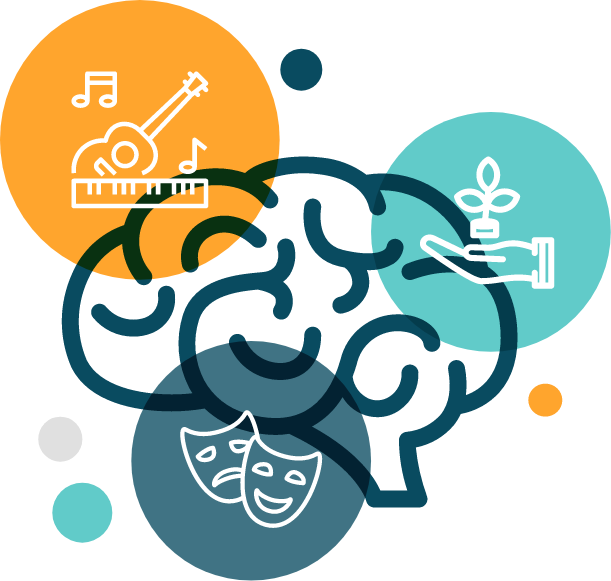There is now a substantial and rigorous literature showing that community engagement can positively impact on physical health, mental health and wellbeing. Social, cultural and community assets prevent the development of health conditions, help people manage and treat their symptoms, and promote health promotion through aiding health communication, affecting determinants of health, and supporting the work of healthcare professionals.
Crucially, these benefits are felt by people regardless of factors such as their demographics, socio-economic status, and other health conditions and behaviours.
Read our WHO review on arts, health and wellbeing
Read our paper “Cultural Engagement and Mental Health: does socio-economic status explain the association?”
Community activities contain ‘active ingredients’ that interact via certain ‘mechanisms of action’ to influence our health. Ingredients can be thought of as specific components that make up the ‘what’ of an activity, whereas mechanisms are the processes that link active ingredients to health outcomes: the how. Mechanisms operate at individual levels but also at group and community levels.
Through extensive focus groups with our members, as well as undertaking the largest review to date, we have identified over 130 ingredients and over 600 psychological, biological, social and behavioural mechanisms.
To enable understanding and further research, we’ve developed a conceptual model called the Multi-level Leisure Mechanisms Framework. We’ve also applied the principles of ‘complexity science’, which are widely used in healthcare research, to help researchers understand how active ingredients and mechanisms interact with each other and lead to health outcomes.

Given the health benefits of engaging in community activities, it is important that individuals are able to access them. However, not everybody does.
To explore this more, we ran a Citizen Science Experiment with the BBC Get Creative Festival, interviewed dozens of MARCH Network members, and analysed data from cohort studies such as the UK Taking Part Study. We found that there are many individual factors that predict people engaging less than others, including low income or education, coming from an ethnic minority background, or not having engaged as a child so not feeling comfortable engaging. Schools help to equalize engagement, but if families are not supported, inequalities can still arise among young children.
Where you live can make a difference too. People living in areas of higher deprivation are less likely to engage in community activities, but if they do engage it can have more benefits for their mental health than people in more affluent areas.
Patterns of social inequality in arts and cultural participation: Findings from a nationally representative sample of adults living in the United Kingdom of Great Britain and Northern Ireland.
Public Health Panorama
Do socio-demographic factors predict children engagement in arts and culture? Comparisons of in-school and out-of-school participation in the Taking Part Survey.
PLoS ONE
Does arts and cultural engagement vary geographically? Evidence from the UK Household Longitudinal Study.
Public Health
Associations between neighbourhood deprivation and engagement in arts, culture and heritage: evidence from two nationally-representative samples
BMC Public Health
Associations between community cultural engagement and life satisfaction, mental distress and mental health functioning using data from the UK Household Longitudinal Study (UKHLS): are associations moderated by area deprivation?
BMJ Open
Mental health itself can also affect our community behaviours. People who are less happy or more anxious or depressed tend to engage less in community activities. For some people, this is because their mental health affects their motivations to engage and makes them feel less confident or capable.
Schemes such as Social Prescribing can help remove some of these barriers. These schemes connect community organisations with healthcare practitioners who refer their patients to community activities. However, some people may still face hurdles such as social anxiety or challenges with transport, and community organisations may find it difficult to connect with such schemes without training, financial resources or additional support. GPs may also feel they have insufficient training or understanding of social prescribing to refer their patients.
What are the barriers to, and enablers of, working with people with lived experience of mental illness amongst community and voluntary sector organisations? A qualitative study.
PLoS one
Barriers and enablers to engagement in participatory arts activities amongst individuals with depression and anxiety: quantitative analyses using a behaviour change framework.
BMC public health
Differential participation in community cultural activities amongst those with poor mental health: Analyses of the UK Taking Part Survey.
Social Science & Medicine
What barriers do people experience to engaging in the arts? Structural equation modelling of the relationship between individual characteristics and capabilities, opportunities, and motivations to engage.
PLoS One
Factors affecting the sustainability of community mental health assets: A systematic review
Health and Social Care in the Community
Fortunately, our research has also identified interventions that could remove these barriers for people and help make community engagement more equitable.

Download the BBC Get Creative Data here for your own analyses

Download the BBC Feel Good Test Data here for your own analyses

Explore how we can make community activities more ‘mental health friendly’
MARCH has worked to support the future of research on community engagement and mental health.
Over 300 members of our network have co-produced a new Research Agenda with us. It identifies the most pressing research gaps in the field and highlights those that are highest priority for different sectors.
We have funded 7 research projects that address:
Developing guidelines for involving people experiencing mental ill-health in heritage projects
Developing evidence based-practice and resources for community singing leaders in mental health context
Natural outdoor environments and mental health: developing sustainability indicators using a cross-disciplinary and multi-stakeholder approach
Sustainability as a behaviour? Exploring the sustainability of community assets for mental health using the behaviour change wheel and the theoretical domains framework
Life at a distance: A pilot study of two mutual aid services to support vulnerable individuals in costal communities
Participation in the arts in individuals with mental ill-health in South London: a population-based survey
Digital community assets and mental health
We also supported 12 Special Interest Groups and 8 Sandpit Events aimed at developing new research proposals. To date, these have led to over £20 million of new research funding being awarded to our members to take this work forwards.

Do you want to learn more about how social, cultural and community engagement affects mental health? Take part in our online training course run in partnership with the Royal Society for Public Health.


